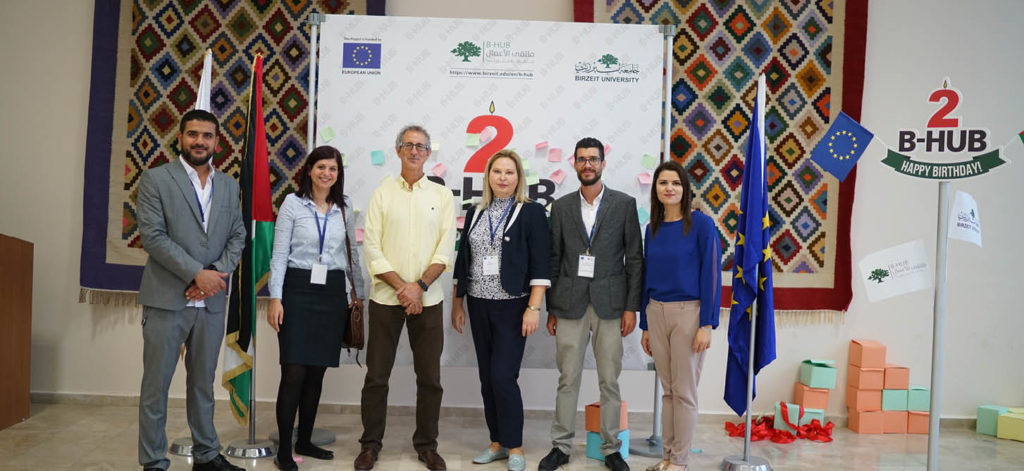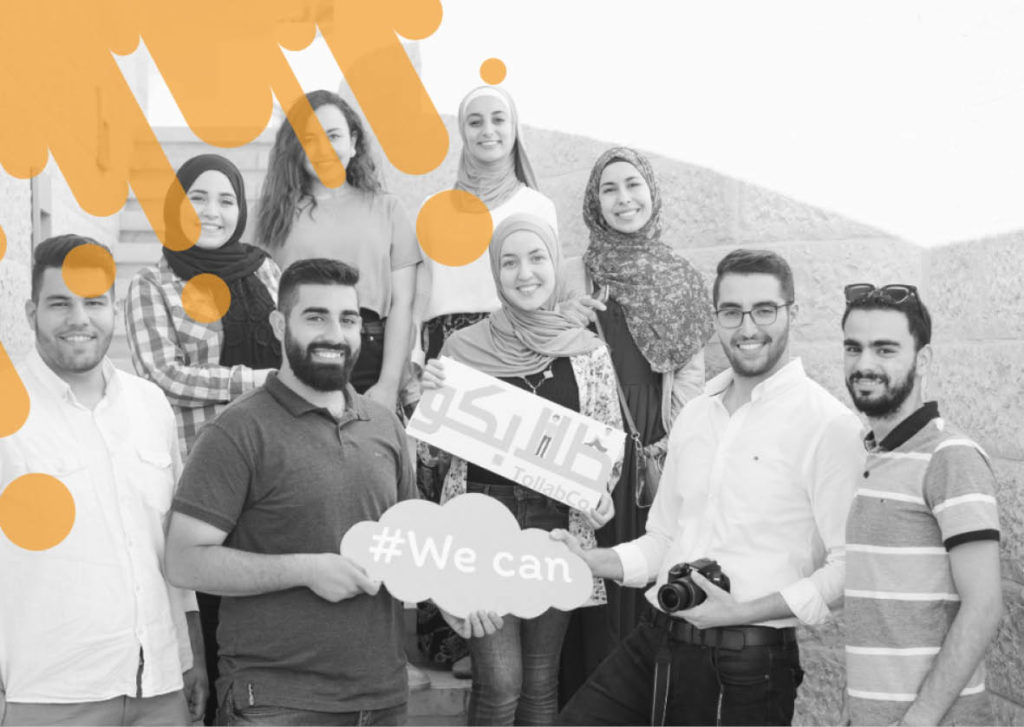Established in 2017 with the support of the European Union, the B-Hub at Birzeit University applies an integrated approach to addressing the most critical problems that face the local economy: unsustainable small businesses, damaging social and environmental practices, and high unemployment rates among Palestinian youth. The hub is an integral part of the university, designed to engage its community, which includes students, faculty, and staff, in filling two important gaps: It serves both Palestinian entrepreneurs, whether from the university or the greater Palestinian community, and owners of existing companies – of any size, operating in any industry, registered or unregistered, and located anywhere in Palestine.
Why is the B-Hub important in our Palestinian context? The Palestinian economy relies heavily on micro and small enterprises, which constitute more than 90 percent of all local enterprises. Whereas larger enterprises provide about 4,500 jobs, the small and micro businesses employ more than 127,000 Palestinians. Due to the numerous obstacles to growth in the captive Palestinian economy (impeded by the Israeli occupation), small enterprises remain the best feasible business model. Ironically, this large economic sector receives the least attention from development agencies. Working with small enterprises is extremely challenging: they don’t have qualified staff able to build capacity from off-the-shelf workshops; they don’t have export potential; and their owners do not consider nicely formatted reports as true deliverables.
As for the employment of university graduates, there is a clear mismatch between the supply and demand: private companies report that they are unable to recruit graduates with up-to-date knowledge and experience relevant to the local context and job market, while 70 percent of graduates cannot find a job! Due to the size and nature of Palestinian enterprises (predominantly micro), internships and apprenticeship opportunities are extremely rare and limited. Palestinian university students are thus deprived of such an important learning modality.
To address this mismatch, the B-Hub has developed a new and unique approach that taps into the enormous knowledge capital of university students and uses it to support micro enterprises and solve the important problems that they face. Through the B-Hub, teams of university students, with the support of faculty members, engage in finding solutions to the challenges and difficulties that confront micro enterprises. This model not only serves the companies but also provides a very practical learning venue for the students and expands the horizons for faculty members. In addition, it stimulates the entrepreneurial mindset of students and gives them ideas for starting their own businesses. The business incubator within the B-Hub drives this agenda further and empowers entrepreneurs to start their own usinesses.

Birzeit University’s B-Hub designs and develops services tailored to the specifics of local micro enterprises and future employees and entrepreneurs. All solutions are provided after a thorough diagnosis of the business performance and context of the micro-market in which the enterprise is operating. Business support is practical and aims to solve very specific problems, such as arranging the inventory, optimizing production processes, developing marketing campaigns and materials, developing new formulas and designs for products, restructuring or incorporating family businesses, building bookkeeping systems, etc.
Potential entrepreneurs are provided with a comprehensive range of support that includes idea generation; business-, production-, and technological-support services; networking opportunities; and incubation space. Existing companies receive support until they meet target revenues.
The B-Hub strongly promotes social and green practices as fundamental elements of the companies it works with. It especially considers the Palestinian context: a business environment held captive by the occupation, social biases and norms that are not sensitive to the environment, and common unfair employment practices. We help local companies adopt social and green practices in a feasible manner, without imposing additional financial burdens.
Currently the cost of all services offered to start-ups, existing companies, and university students is covered by EU funds. B-Hub also cooperates with other development agencies in implementing their projects that focus on entrepreneurship and private-sector development, on a cost-sharing basis. We are also working on financial sustainability through offering our business and technical services to successful companies as well as offering our premises for rent to be used for training, conferences, and other business activities.

From October 2017 (when it began to offer services) to December 2019, B-Hub has provided training and mentoring services to 2,471 beneficiaries. Twenty-seven start-ups were established and are currently operational, and another 35 are ready to begin. Eighty-five local private companies and production cooperatives (mainly women-owned) have boosted their operations. The industries supported vary widely and include manufacturing companies that produce paper, plastic, detergents, food, face and body treatment, construction materials, etc.; innovative IT startups; ecotourism; the invention of resources to replace imported raw materials with local ones; organic farming; educational services; waste recycling; art salons; entertainment; and e-commerce.
TollabCo start-up represents one of the most successful B-Hub achievements. With a very simple but potent idea – provision of knowledge-based services by university students to individual and corporate clients – three Birzeit University civil engineering students, Ameen Taha, Ahmad Edkedeik, and Tareq Ziyad, were up against five other teams, whittled down from over 200,000, in the final phase of the 2019 Hult Prize Challenge, the world’s largest student social entrepreneurship competition, and represented the Middle East at the United Nations stage in New York. The three students, TollabCo founders, were the first applicants to the newly established B-Hub in 2017. They had a dream – not even a business idea – to have their own business. Since that time, B-Hub has assisted them in framing their idea, planning, determining the services, structuring the company, registering the business, developing the financial system, and preparing for the Hult Prize Challenge. To date, TollabCo has engaged 450 students in service provision and has been able to gain $60,000 in 2018–2019. We are now working together on the TollabCo expansion in the regional Arab markets in such countries as Jordan, Tunis, and the United Arab Emirates.
Ratteb Umurak, a company located in Fawar Refugee Camp near Hebron, is operated by a 25-year-old young man. The company offers cleaning and logistics services and employs 20 male youth from the camp. B-Hub provided assistance with company registration at the Palestinian Ministry of National Economy and the opening of a tax file, which allowed the company to compete for governmental tenders. In addition, support was offered to create the financial system, to structure the relations with employees, including the provision of official contracts and life and health insurance (extremely important considering the dangerous nature of their work related to cleaning the façades of high buildings), and to devise a three-year business plan.
KTI, a company located in Hebron, produces plastic products from plastic waste. B-Hub provides support to develop a chemical formula for new products to replace the Israeli products that currently dominate the local market. B-Hub also provides assistance in formulating a business plan to introduce new products.
PaperPal, a company located in Jericho, produces paper products from paper waste and palm leaves. B-Hub provides assistance in adjusting production-line capacity; calibrating the automated equipment; developing solutions for cleaning wastewater to prevent environmental harm; creating chemical solutions to de-ink the wastepaper and prepare it for recycling; and creating chemical solutions to whiten the paper produced from waste materials.


